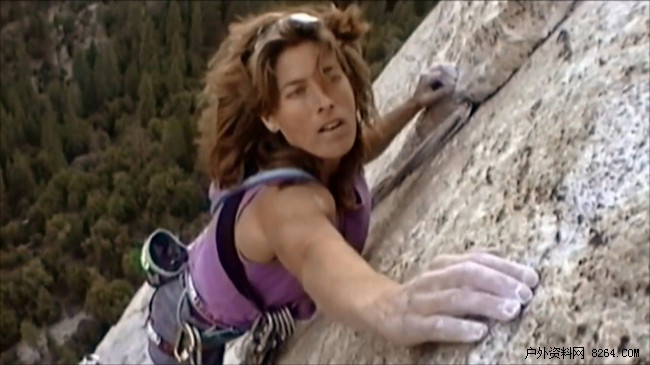Lynn Hill is a legendary figure in contemporary rock climbing. He started rock climbing at the age of 14 and quickly became a master. At about the age of 16, Lynn became the first woman to climb a 5.12d difficulty course. In 1993, for the first time, she freely climbed the Nose route on El Capitan to complete the rock climbing task that was considered impossible at that time and achieved another major achievement in climbing history. Climbing, running, skiing, and raising sons constitute the main activities of Lynn's daily life.

Early years of Lynn Hill
In addition to being an outstanding climber in the world, she is also a great blogger. Next we share her profound insights on rock climbing. There are seven sections that will be introduced one by one. Today's theme is:
Mental endurance
Many people asked me how I did climbing training. My first answer is: of course through rock climbing! When I want to prepare for a rock climbing activity, in order to achieve my goals, I will choose specific rock climbing types to train. In rare cases, however, when climbing is not enough to make me fully prepared, I will choose other forms of training as a supplement. For example, when climbing El Capitan's Nose route by free climbing, because the route is nearly 3,000 feet (900 meters) in length, the most difficult climbing section is more than 2,000 feet (600 meters) above the ground, so I need to train at such a high altitude. Under the stamina.
In the training for this rock climbing, every day, I not only have to train as long as possible, but also spend at least 1-1.5 hours running with greater intensity. I need enough stamina and enough strength to climb this most difficult route in freestyle. Therefore, I need to combine endurance training with strength training, and this approach is sometimes not very good, because research shows that endurance training affects the effectiveness of strength training. Nevertheless: Regardless of the sport or activity, the most important factors of endurance training are psychologically related. So, in today's article, I will share with you the psychological qualities of endurance training that I learned in my athletic career.
For me, psychological quality is far more important than physical fitness in all activities. Because all actions originate from an idea, psychological quality will certainly have a profound effect on our performance. I have found that many times my body is fully capable of maintaining the level of physical fitness necessary to meet specific challenges, but my psychology has always been a limiting factor. I remember that when I was training for 1,500 meters and 3,000 meters in college, I had to be psychologically self-disciplined. This process was as tough as any exercise I had ever had - including climbing!
The most critical aspect of this kind of psychological training is to learn to accept and accept the pain or psychological resistance during the training. Whenever I feel I can't make more efforts, I try to change my mind (this is my own name). I will no longer pay attention to fatigue, but focus on my own breathing and how to maintain a perfect posture. By focusing on how I swing my arm and how to get out of the most efficient trajectory, my attention is directed to more productive things and I can more easily accept the hardships of training.
Another way I force myself to work hard is to choose the reasonable training goals that I can achieve. For example, I will choose specific landmarks or time periods, and I will maintain a faster speed until the end of the selected landmark or time period is reached; once I reach a given geography or time cutoff point, I usually continue my original strength. , set a new landmark or time period again. As long as continuing to train at the current speed will not cause damage, I will never allow myself to give up before completing any goals. I have found that setting multiple small goals and achieving multiple small successes accordingly gradually increase my motivation. This method will make training easier. By selecting multiple progressive goals, I can more easily maintain a strong mental resilience and push myself all the way to the end of training.
Although most forms of endurance training require high training intensity, the psychological endurance in climbing is more of a need for the climber to maintain confidence and work hard until it reaches the peak. When I feel tired, it's usually when I don't know what steps to take next. In this case, I will wait for a moment until I resume my confidence in acting again. But if you wait too long, I may lose more valuable power. This time, if you can know how to relax, recover and plan the next climbing steps, it will be very critical. During my climbing career, I have learned how to relax my muscles and trust my instincts. When the power is declining, I will focus on taking action. Once I really act with 100% confidence, I will succeed in most cases. And if I fall, it's usually because the method or technique is wrong. I rarely fall simply because I can no longer insist on it. We are more prone to short-sightedness when we are tired.
In such difficult times, we may lose our conscious mind or fail to choose the most effective skills. Therefore, like most other sports, the key to rock climbing is to maintain the correct mentality.



